5-HTP and Serotonin Support for Short Sleep Recovery
Introduction
You know that foggy, groggy feeling after a short night’s sleep? 😴 Your body feels heavy, your mind slow, and everything — even a morning coffee — feels less effective.
What’s really happening under the surface isn’t just fatigue — it’s a neurochemical imbalance, especially in serotonin, one of your brain’s most vital mood and sleep regulators.
Fortunately, there’s a natural compound that can help rebalance your system after sleep loss: 5-HTP (5-Hydroxytryptophan).
Let’s explore how 5-HTP works, why serotonin is key to short sleep recovery, and how to safely combine it with other lifestyle and supplement strategies for deeper, faster rest. 🌿🧠
Looking for supplements for Brain Fog? Click here.
🧬 Understanding Serotonin’s Role in Sleep and Recovery
Serotonin is often called the “feel-good hormone,” but its role goes far beyond mood. It helps regulate sleep cycles, appetite, body temperature, pain sensitivity, and emotional resilience.
When you don’t sleep enough, your serotonin system becomes disrupted. Here’s how:
💤 Sleep loss reduces tryptophan uptake — the amino acid that makes serotonin.
⚡ Cortisol (stress hormone) rises, depleting serotonin further.
💭 Neurotransmitter balance shifts toward alertness (dopamine, norepinephrine) instead of calmness.
The result?
You wake up anxious, irritable, or unmotivated — even after caffeine.
💡 Restoring serotonin helps you recover not just physically, but emotionally — making short nights less damaging to your mood and energy.
🌿 What Is 5-HTP?

5-HTP (5-Hydroxytryptophan) is a natural compound made from the amino acid L-tryptophan, found in foods like turkey, bananas, and oats.
Inside your body, 5-HTP converts directly into serotonin, which later transforms into melatonin — your primary sleep hormone.
That means 5-HTP plays a dual role:
Boosting daytime mood and focus 🌞
Supporting nighttime rest and recovery 🌙
Because it crosses the blood-brain barrier efficiently, supplementing with 5-HTP is one of the fastest ways to restore serotonin balance after sleep deprivation.
🧠 How Sleep Deprivation Disrupts Serotonin
A few nights of short sleep can significantly alter serotonin function.
Here’s what happens biologically:
Reduced synthesis: Sleep loss lowers enzyme activity that converts tryptophan → 5-HTP → serotonin.
Increased breakdown: Cortisol accelerates serotonin metabolism.
Poor receptor sensitivity: Inconsistent sleep desensitizes serotonin receptors, making your brain less responsive.
This creates a loop: less serotonin → poor sleep → even less serotonin.
That’s why restoring serotonin through 5-HTP supplementation can shorten recovery time after limited rest — breaking that cycle.
⚙️ The 5-HTP Sleep Recovery Mechanism
Here’s how 5-HTP helps your brain and body bounce back from short sleep:
🧩 Step 1: Serotonin Restoration
5-HTP increases serotonin availability in the brain, improving mood and focus during the day.
🌙 Step 2: Melatonin Production
At night, serotonin converts into melatonin, improving sleep onset and quality.
💭 Step 3: Emotional Stability
Balanced serotonin lowers cortisol and anxiety, making recovery deeper and faster even if sleep is shorter.
💡 The goal isn’t to knock you out — it’s to repair the biochemistry that allows natural rest.
💊 Benefits of 5-HTP for Sleep and Recovery
Scientific studies suggest 5-HTP can enhance both sleep depth and mental balance after sleep loss.
✅ Key Benefits:
Improves sleep onset and duration
Increases REM sleep (dream stage where emotional recovery occurs)
Stabilizes mood under fatigue and stress
Enhances focus and motivation the next day
Reduces appetite dysregulation linked to poor sleep
🌿 It supports the full mind-body recovery cycle — not just sleep duration.
⏰ How to Use 5-HTP After Short Sleep Nights
Timing is key to optimizing 5-HTP’s effects.
🌞 Morning Use (50–100 mg)
Use lower doses if you want a mood and focus lift after a poor night’s sleep — especially if you feel irritable or mentally flat.
🌙 Evening Use (100–200 mg)
Take 30–60 minutes before bed to promote melatonin conversion and deeper sleep the following night.
⚙️ Tips for Optimal Use:
Take on an empty stomach (better absorption).
Avoid combining with SSRIs or antidepressants (they both raise serotonin).
Pair with Vitamin B6 — it enhances serotonin synthesis.
Cycle 5-HTP (e.g., 5 days on, 2 days off) to prevent tolerance.
💡 Always start low and assess your individual response — serotonin sensitivity varies.
🧩 Stacking 5-HTP with Other Supplements for Sleep Recovery
The real power of 5-HTP lies in synergy — combining it with complementary nutrients that enhance its effects.
🌙 Sleep Recovery Stack:
5-HTP: 100 mg
Magnesium Glycinate: 300 mg
Glycine: 3 g
L-Theanine: 200 mg
💤 Promotes calm, relaxation, and serotonin-to-melatonin conversion.
☀️ Morning Recovery Stack:
CoQ10: 100 mg
B-Complex: 1 capsule
Rhodiola Rosea: 300 mg
Omega-3s: 1000 mg
⚡ Supports mitochondrial energy and mental clarity post-sleep deprivation.
Looking for supplements for Brain Fog? Click here.
🧘 Breathwork: The Natural Serotonin Booster
You don’t need pills to raise serotonin — your breath can do it too. 🌬️
Try This: “Coherent Breathing for Serotonin Balance”
Inhale through the nose for 5 seconds
Exhale through the nose for 5 seconds
Continue for 5–10 minutes
Benefits:
Increases parasympathetic activity (relaxation response)
Balances serotonin and dopamine levels
Lowers cortisol and blood pressure
✨ Combine this with 5-HTP in the evening to prime your nervous system for deep recovery.
Want to try Breathwork? Click Here.
💭 Therapy: Supporting the Mind After Sleep Loss

Sleep deprivation doesn’t just make you tired — it magnifies emotional responses.
Even minor stressors can feel overwhelming when serotonin levels are low.
Therapy helps you process emotional fatigue and restore mental clarity faster.
Benefits of Therapy During Recovery:
Reduces mental overactivity at night
Helps manage mood swings and irritability
Teaches grounding techniques for short nights
Supports serotonin stability through emotional regulation
🧠 Pair emotional awareness with biochemical support — that’s holistic recovery.
Looking for online therapy ? Click Here.
🍽️ Foods That Naturally Support Serotonin
Your diet provides the raw materials for serotonin synthesis.
When sleep is short, your body burns through these faster — so replenishing them matters.
🥗 Eat More Of:
🐟 Salmon — high in Omega-3 and tryptophan
🍌 Bananas — natural serotonin precursors
🌰 Nuts & Seeds — magnesium and B-vitamins
🍳 Eggs — rich in B6 and amino acids
🥬 Spinach — folate for neurotransmitter synthesis
🚫 Avoid:
Excess caffeine — overstimulates cortisol
Processed sugars — spike and crash serotonin levels
Alcohol — disrupts REM recovery
💡 Your supplements work better when your plate supports them.
🧠 How 5-HTP Differs from Melatonin
While melatonin helps you fall asleep, 5-HTP helps you stay balanced.
| Supplement | Primary Function | Best Use |
|---|---|---|
| Melatonin | Regulates sleep timing | Short-term use, jet lag |
| 5-HTP | Supports serotonin + melatonin | Stress, mood, short sleep recovery |
🌿 5-HTP supports both your mood and circadian rhythm — giving it broader benefits than melatonin alone.
🕓 A 24-Hour Serotonin Recovery Schedule
Here’s a realistic plan for short sleep recovery using 5-HTP and supporting supplements.
| Time | Action | Why It Helps |
|---|---|---|
| ☀️ 7:00 AM | Wake up + water + sunlight | Boosts natural serotonin |
| 🧘 7:15 AM | Breathwork or stretching | Calms cortisol |
| 🍳 7:30 AM | Protein-rich breakfast | Provides amino acids for serotonin |
| 💊 8:00 AM | B-complex + Omega-3 + CoQ10 | Supports brain energy |
| ☀️ 12:00 PM | Balanced lunch + hydration | Prevents mid-day serotonin dip |
| 🌿 6:00 PM | Ashwagandha or Rhodiola | Reduces evening stress |
| 💊 9:00 PM | 5-HTP + Magnesium + Glycine | Supports serotonin → melatonin |
| 💤 10:00 PM | Journaling + 4-7-8 breathing | Lowers heart rate and calms mind |
⚙️ Consistency builds recovery faster than random fixes.
⚠️ Safety and Cautions
While 5-HTP is natural, it’s still powerful.
⚠️ Do NOT combine 5-HTP with:
SSRIs, SNRIs, or MAOIs (antidepressants)
St. John’s Wort (serotonin booster)
High doses of melatonin (>3 mg regularly)
Why: These can lead to excess serotonin (serotonin syndrome) — symptoms include confusion, rapid heartbeat, or sweating.
Always start with low doses and consult your healthcare provider if you’re on medication.
🧩 Tracking Your Progress
Pairing 5-HTP with sleep tracking devices (like Oura or Whoop) can help measure your improvements:
✅ Increased REM sleep
✅ Lower resting heart rate
✅ Higher HRV (heart rate variability)
✅ Improved morning mood scores
💡 Data helps personalize your serotonin strategy — what gets measured gets improved.
🧘 The Mindset of Short Sleep Resilience
5-HTP isn’t just about chemistry — it’s about training your body to recover smarter.
When you combine biochemical support (5-HTP, magnesium), physical calm (breathwork), and emotional awareness (therapy), your system learns to bounce back faster after stressful or sleepless nights.
🌙 You’re not chasing sleep — you’re building resilience.
🌟 Final Thoughts
Short nights happen — but exhaustion doesn’t have to control your day.
With 5-HTP and serotonin support, you can help your brain rebalance faster, recover your mood, and get back on track even when sleep isn’t perfect.
When combined with breathwork, mindful therapy, and nutrient-dense meals, 5-HTP turns reactive recovery into proactive resilience.
✨ Sleep less if you must — but recover smarter every time. 🌙💊
📚References
Birdsall TC. “5-Hydroxytryptophan: a clinically-effective serotonin precursor.” Altern Med Rev. 1998;3(4):271–280.
Jacobs BL, et al. “The role of serotonin in sleep regulation.” Sleep Med Rev. 2002;6(5):501–510.
Kaur G, et al. “Ashwagandha in stress and sleep quality.” Cureus. 2021;13(5):e15041.
Streeter CC, et al. “Breathwork and autonomic balance.” J Altern Complement Med. 2012;18(5):402–412.
Kennedy DO. “Nutritional nootropics for mood and sleep support.” Nutrients. 2016;8(11):68.
Related Posts
-
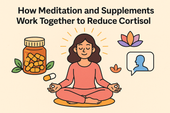
How Meditation and Supplements Work Together to Reduce Cortisol: A Complete Guide to Calming the Mind and Body
Meditation and supplements can work hand in hand to naturally reduce cortisol, your body’s main stress hormone. 🌿 Learn how mindfulness practices, adaptogenic herbs, and nutrient support like magnesium, omega-3s, and B vitamins create a powerful synergy for calm, focus, and emotional balance—backed by science and daily rituals that truly reset your stress response.
-
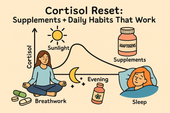
Cortisol Reset: Supplements + Daily Habits That Work
-
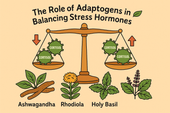
The Role of Adaptogens in Balancing Stress Hormones
Adaptogens work at the root of stress — your nervous system. 🌿 Learn how these powerful herbs help regulate cortisol, calm your nerves, and restore balance between energy and relaxation. ✨
-
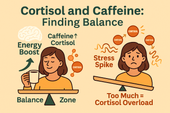
Cortisol and Caffeine: How Much Is Too Much?
Caffeine can boost energy and focus — but too much can overstimulate your stress hormones. ☕ Learn how caffeine affects cortisol, energy levels, and mood, and discover how to find the perfect balance for lasting calm and clarity. 🌿
-
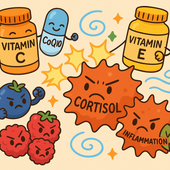
Antioxidants for Stress Management and Cortisol Control
When stress overwhelms your body, antioxidants come to the rescue. 🌿 Learn how vitamin C, CoQ10, and other natural compounds help reduce oxidative stress, regulate cortisol, and restore calm energy from within. ✨
-
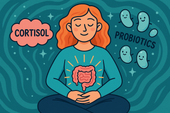
Cortisol and Gut Health: How Probiotics May Help
Chronic stress doesn’t just affect your mind — it changes your gut. 🌿 Learn how cortisol disrupts the microbiome and how probiotics can help restore balance, improve digestion, and calm your stress response naturally. ✨
-

Vitamin D and Cortisol: Supporting Immune Balance
Vitamin D does more than strengthen bones — it helps regulate cortisol and support immune balance. 🌞 Learn how this essential hormone-like nutrient restores calm, improves mood, and strengthens your body’s natural stress defenses. 🌿
-
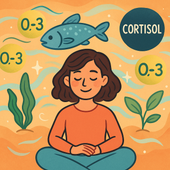
Omega-3s and Cortisol: Fighting Inflammation Naturally
Omega-3s are more than heart-healthy fats — they’re natural cortisol regulators. 🌿 Learn how EPA and DHA help reduce chronic inflammation, calm the nervous system, and support stress recovery from the inside out. ✨
-
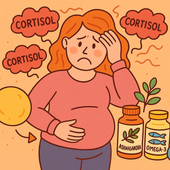
High Cortisol and Belly Fat: Can Supplements Help?
Chronic stress can make belly fat harder to lose — but supplements like ashwagandha, magnesium, and omega-3s may help restore cortisol balance. 🌿 Learn how science-backed nutrients support fat metabolism, calm your stress response, and bring your body back into harmony. ✨
-
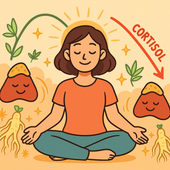
How Ginseng Can Support Energy and Cortisol Balance
Ginseng is one of nature’s most powerful adaptogens, helping your body handle stress without burning out. 🌿 Learn how this ancient root supports balanced cortisol, steady energy, and sharper focus — restoring vitality naturally and sustainably. ✨
-
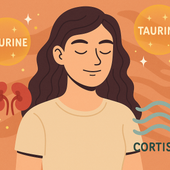
Taurine and Cortisol: Supporting Focus Under Stress
When cortisol surges, focus fades — but taurine helps restore balance. 🌿 Learn how this powerful amino acid calms your nervous system, regulates stress hormones, and sharpens concentration without jitters or fatigue. ✨
-
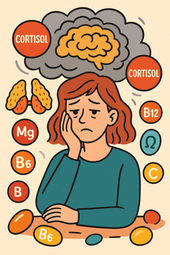
The Link Between Cortisol, Brain Fog, and Nutrient Deficiencies
When brain fog sets in, it’s not just in your head — it’s in your hormones. 🌿 Discover how cortisol imbalance and nutrient deficiencies like low magnesium, B vitamins, and omega-3s can cloud your focus and how restoring balance brings back mental clarity and calm. ✨
-
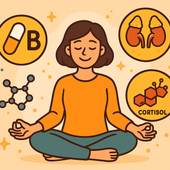
B Vitamins for Stress, Energy, and Cortisol Regulation
B vitamins are the foundation of stress resilience and steady energy. 🌿 Learn how this essential group of nutrients helps regulate cortisol, restore focus, and keep your nervous system calm — giving you balance from the inside out. ✨
-

Cortisol Imbalance and Chronic Fatigue: Can Supplements Help?
When chronic stress keeps cortisol high, fatigue and brain fog follow. 🌿 Learn how to rebalance your stress hormones naturally with calming nutrients, adaptogens, and lifestyle rituals that restore energy, focus, and inner peace. ✨
-

Adaptogen Stacks for Better Sleep and Lower Stress Hormones
Adaptogens can help your body recover from stress and sleep better by regulating key hormones like cortisol and adrenaline. 🌿 Learn how adaptogen stacks work to restore balance, calm the mind, and rebuild resilience — so you can rest deeply and wake renewed. ✨
-

Phosphatidylserine for Nighttime Cortisol Control
When stress hormones stay high at night, deep rest becomes impossible. 🌙 Discover how phosphatidylserine helps calm the brain, reduce nighttime cortisol, and restore healthy sleep rhythms — so you can wake up peaceful, clear, and recharged. ✨
-

Magnesium for Stress Relief and Cortisol Reduction
Magnesium is one of the most powerful natural tools for stress relief. 🌿 This essential mineral calms your nervous system, lowers cortisol, and helps your body recover from chronic tension. Learn how magnesium replenishes balance, improves sleep, and restores inner peace — naturally. ✨
-

Supplements to Improve Sleep by Balancing Cortisol
When cortisol stays high at night, sleep becomes a struggle. 🌙 Discover natural supplements that calm the nervous system, lower stress hormones, and restore your body’s natural rhythm. From magnesium and ashwagandha to L-theanine and phosphatidylserine, learn how to build deeper, more restorative rest. 🌿
-

Cortisol and Sleep: Why Stress Keeps You Awake
When stress keeps your body in fight-or-flight mode, cortisol refuses to calm down — and sleep becomes impossible. 🌙 Learn how elevated cortisol disrupts your circadian rhythm, suppresses melatonin, and turns restless nights into exhaustion. Discover how to restore balance and reclaim deep rest. ✨
-

L-Theanine for Cortisol Balance and Anxiety Relief
L-Theanine — the calming amino acid from green tea — helps quiet the mind and balance cortisol, the body’s key stress hormone. 🌿 Learn how it promotes calm focus, eases anxiety, and supports deep rest without sedation, backed by modern research and centuries of tradition. ✨
-

Rhodiola Rosea and Stress Resilience: A Natural Cortisol Regulator
Rhodiola rosea is one of nature’s most powerful tools for resilience. 🌿 This Arctic root helps balance cortisol, fight fatigue, and sharpen focus — keeping you calm yet energized even under stress. Discover the science behind Rhodiola’s adaptogenic power and how it helps your body thrive under pressure. ✨
-

Ashwagandha for Cortisol Balance: What the Science Says
Ashwagandha helps your body recover from chronic stress by calming the adrenal system and balancing cortisol — your key stress hormone. 🌿 Learn what science says about this powerful adaptogen, how it restores energy and focus, and why it’s one of nature’s most effective tools for modern stress relief. ✨
-

Supplements That Naturally Lower Cortisol Levels
When cortisol levels calm, your energy transforms — no more crashes or jitters, just steady focus and inner peace. 🌿 Learn which natural supplements and habits lower stress hormones, boost calm energy, and help your body thrive with balance instead of burnout. ✨
-

What Is Cortisol Imbalance? Symptoms You Shouldn’t Ignore
Cortisol — your body’s main stress hormone — keeps you alert and energized, but when it’s out of balance, it can drain your health. 🌿 Learn the signs of cortisol imbalance, from fatigue and anxiety to sleep disruption and stubborn weight gain, and discover how to restore calm, energy, and hormonal harmony naturally. ✨
-

The Best Daily Multivitamins for Menopausal Women
Menopause brings new nutritional needs that your old vitamin routine may no longer meet. 🌿 Discover how the right daily multivitamin can boost energy, balance mood, support bone and heart health, and keep your skin glowing. Learn which nutrients truly matter — from vitamin D to magnesium and B12 — to feel strong and vibrant every day. ✨
-

Antioxidants and Menopause: Fighting Inflammation Naturally
During menopause, oxidative stress and inflammation can quietly accelerate aging, fatigue, and skin changes. 🌿 Learn how antioxidants — from vitamins C and E to polyphenols in berries and green tea — help neutralize free radicals, reduce inflammation, and restore balance naturally. Discover the science of radiant, resilient aging. ✨
-

How CoQ10 Supports Heart Health After Menopause
After menopause, heart health becomes more important than ever. ❤️ Discover how CoQ10 — your body’s natural energy molecule — supports cardiovascular strength, restores vitality, and protects against oxidative stress. Learn how this essential nutrient helps keep your heart energized, balanced, and resilient through every stage of life. 🌿
-

Collagen Supplements for Skin and Joint Health Post-Menopause
After menopause, collagen loss affects both skin elasticity and joint comfort — but supplements can help rebuild from within. 🌸 Learn how collagen peptides, vitamin C, and other nutrients work together to restore firmness, reduce stiffness, and keep you glowing and mobile well into your next chapter. ✨
-

Calcium and Vitamin D: Protecting Bone Health in Menopause
Menopause brings hormonal changes that can weaken bones—but with the right nutrients, strength and stability can be rebuilt. 🦴 Learn how calcium and vitamin D work together to protect bone density, prevent fractures, and keep your body resilient. This guide explores nutrition, sunlight, and lifestyle habits that help your bones stay strong and vibrant for years to come. ☀️💪
-

Adaptogens for Energy and Resilience During Menopause
Feeling drained or emotionally scattered during menopause? 🌿 Discover how adaptogenic herbs like Ashwagandha, Rhodiola, and Ginseng can restore energy, balance cortisol, and build emotional resilience. Learn how these natural allies work with your body—not against it—to help you stay strong, focused, and calm through life’s hormonal changes. 🌸
-

Supplements That Help Beat Menopause Fatigue
Menopause fatigue can feel like more than tiredness—it’s a total energy crash. This guide explores how specific supplements, mindful breathwork, and therapy can help restore balance. Learn how nutrients like B vitamins, magnesium, and adaptogens rebuild your stamina, while breathwork and emotional healing calm your nervous system and bring vitality back to your days. 🌿✨
-

Herbal Blends for Menopausal Restlessness: Finding Calm in Transition
Herbal blends bring the wisdom of nature into moments of rest and renewal. Discover how soothing herbs like chamomile, lemon balm, and ashwagandha work together to calm menopausal restlessness, balance hormones, and invite deep relaxation. 🌿💫
-

Magnesium + Glycine for Deep Sleep During Menopause
Nutrients like magnesium, glycine, and B vitamins form the foundation for deep, restorative sleep during menopause. Discover how these natural compounds calm your nervous system, balance hormones, and help you wake up refreshed and recharged. 🌿💤
-

Melatonin and Menopause: Restoring Your Sleep Cycle
Nutrients are the foundation of hormone balance and energy. Learn how vitamins, minerals, and whole foods like greens, salmon, and berries nourish women’s bodies during menopause and beyond — restoring vitality, mood, and strength. 🌿🥗
-

How L-Theanine Helps With Menopausal Anxiety
Science continually deepens our understanding of the human body, from hormones to neurotransmitters. Discover how evidence-based research shapes modern wellness — bridging natural medicine, neuroscience, and hormone balance for healthier living. 🔬🌿
-

Can Ginkgo Biloba Improve Memory in Menopausal Women?
Hormone therapy can be a powerful tool for easing menopause symptoms and restoring balance. Learn how it works, the types available, and how to combine it safely with lifestyle and natural support for optimal well-being. 🌸💊
-

B Vitamins for Mental Clarity During Menopause
Nutrients are the foundation of mental and physical balance during menopause. Discover how vitamins, minerals, and whole foods like leafy greens, fish, nuts, and citrus can fuel energy, clarity, and calm while supporting hormonal health. 🌿✨
-

Mood Swings and Menopause: Natural Nutrient Support
Probiotics do more than support digestion — they help balance mood, hormones, and immunity too. Learn how a healthy gut microbiome can ease menopause symptoms, boost energy, and improve emotional resilience naturally. 🌿🦠
-

Brain Fog in Menopause: Supplements That May Help
Supplements can be powerful allies in restoring balance, energy, and focus—especially during menopause. Learn how nutrients like omega-3s, vitamin D, magnesium, and herbal adaptogens work together to support brain health, reduce stress, and promote lasting vitality. 🌿💊
-

Adaptogen Stacks for Reducing Night Sweats
Hormone detox isn’t about cleansing your body—it’s about restoring flow. Learn how the liver, gut, and endocrine systems work together to eliminate hormone buildup and how herbs like milk thistle, dandelion, and schisandra support balance, clarity, and natural vitality. 🌿💫
-

Cooling Menopause Symptoms with Herbal Support
Ashwagandha is one of nature’s most powerful adaptogens, helping women manage stress, sleep better, and balance hormones naturally. Discover how this ancient root supports calm energy, emotional resilience, and relief from menopause-related anxiety and fatigue. 🌿💫
-

Evening Primrose Oil and Menopause: What the Research Says
Hot flashes are one of the most common—and frustrating—symptoms of menopause. Discover what causes them, why the body’s “internal thermostat” becomes unbalanced, and the natural supplements and lifestyle shifts that can help you cool down, rest better, and feel more in control. 🔥💧
-

How Black Cohosh Helps with Menopausal Symptoms
Sleep disturbances are among the most exhausting symptoms of menopause—but they don’t have to rule your nights. Discover how natural strategies and calming supplements can help you fall asleep faster, stay asleep longer, and wake up feeling truly restored. 🌙💤
-

Natural Supplements That May Reduce Hot Flashes
Hot flashes can disrupt sleep, confidence, and daily comfort—but natural relief is possible. Discover the best research-backed supplements like black cohosh, red clover, and licorice root that may reduce hot flashes, balance hormones, and restore inner calm during menopause. 🌿💫
-

Omega-3s and Menopause: Supporting Mood and Inflammation
Omega-3 fatty acids are essential for hormonal harmony, brain function, and emotional balance—especially during menopause. Learn how these healthy fats reduce inflammation, support heart health, and restore calm, vitality, and focus through every stage of midlife. 🌊💫
-

The Role of Vitamin D in Menopausal Health
Vitamin D plays a powerful role in menopausal health—supporting bone strength, hormone balance, and mood stability. Discover how optimizing your vitamin D levels can improve sleep, energy, and emotional well-being while protecting long-term vitality through every stage of menopause. 🌞💪
-

Magnesium for Menopause: Relaxation, Sleep, and Hormonal Support
Self-regulation is the art of staying calm, centered, and in control—no matter what life throws your way. Learn how to strengthen emotional balance, manage stress responses, and cultivate inner peace through mindful techniques that reconnect your heart, body, and brain. 🌿💫
-

Can Adaptogens Like Ashwagandha Ease Menopausal Symptoms?
Brain fog during menopause can make even simple tasks feel overwhelming—but you’re not losing your sharpness, your hormones are simply shifting. Discover how adaptogens like ashwagandha and key nutrients can restore mental clarity, balance cortisol, and bring calm focus back to your day. 🌿🧠
-

Supplements That Support Hormonal Balance During Menopause
Herbal supplements have supported women’s health for centuries—and modern science is finally catching up. From ashwagandha and maca to red clover and rhodiola, discover how nature’s most trusted herbs can calm stress, balance hormones, and enhance energy through every life stage. 🌿✨
-

The Ultimate Motivation Stack: Supplements That Work Together
Discover how therapy helps restore motivation, focus, and emotional balance alongside supplement and mindset strategies. This empowering article explores how addressing thought patterns and emotional blocks through therapy can complement biochemical tools for long-term drive and well-being. 🧠💬


















































